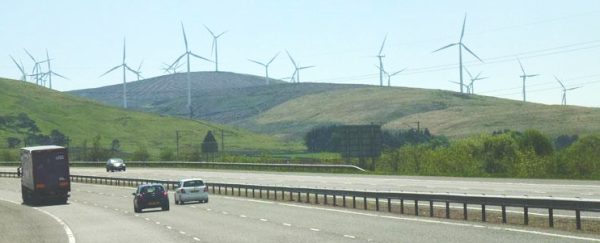
Tourism about to decline in Scotland
Tourism, at present, is a major industry in Scotland.
It is soon set to change. Here is a picture showing wind turbines in Scotland on the M74 south of Glasgow. 200 turbines, continuing for many miles, near Beattock summit.

It's known as Turbine Alley. This is one of many turbine-covered hills on the M74.
Making views like this, irrrespective of the views of local people, is now official SNP policy.
I saw a copy of the All-Energy 2013 Official Launch Magazine, regarding the renewables show in the energy city, Aberdeen, 22/23 May 2013, which said the following:
"Clean energy doesn't cost money, it makes money."
All-Energy, the UK's largest renewable energy exhibition and conference, is designed to help you do just that, yes, make money, along with making contacts and forging new business relationships.
I didn't see this in the local papers or reported by the BBC.
The only money wind power attracts in the UK is subsidy. The jobs it creates are nearly all overseas; we don't make turbines or turbine infrastructure in this country.
As for the effects on tourism: Visit Scotland says that tourist numbers to the country rose by 9 per cent last year, but a regional breakdown showed that many of the areas with the most wind farms – such as South Ayrshire and the Western Isles - suffered declines.
Government surveys say there isn't a problem, and that tourists will still want to come to a countryside covered in turbines and pylons.
However the impact of wind farms on house prices is a surer barometer of public views of wind farms than small scale polls of public opinion conducted by wind farm developers or government agencies.
Fears regarding house prices are borne out by residents' experiences elsewhere in the UK, with a recent survey showing a 20% devaluation for wind-adjacent properties. Those in very close proximity may become unsaleable.
It is likely that the main losers from the wind turbine industry in Scotland and elsewhere will be small hotels and family B&B establishments unlucky enough to be sited closest to wind farm develpments.
CPRE's policy guidance note on climate change and onshorde wind has recently been updated. It says that it would like full assessments of the cumulative impacts of wind turbine developments included in the decision making process - i.e. whether or not to grant planning permission.
Finally, a question.
If wind farms are so clean, cheap and eco friendly, why are other countries with more experience of wind turbines than the UK (e.g. Germany) ceasing wind farm development and building more coal fired power stations?

big turbines
small turbines